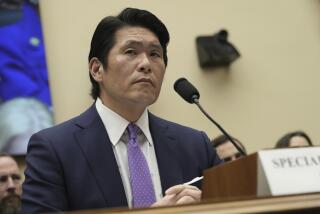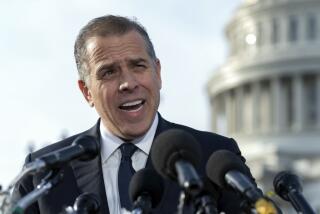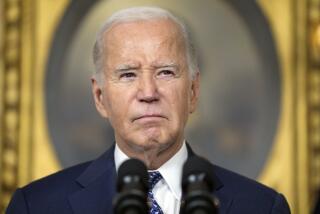Former aide: Bush should tell all on CIA leak
A former White House spokesman told Congress on Friday that President Bush and Vice President Dick Cheney wanted him to say that Cheney’s chief of staff wasn’t involved in the leak of a CIA operative’s identity, an assertion that turned out to be false.
Scott McClellan, Bush’s spokesman from 2003-2006, said he had reservations about publicly clearing the name of I. Lewis “Scooter” Libby, Cheney’s chief of staff at the time. Later, Libby was convicted of obstructing the investigation of the leak of Valerie Plame’s CIA identity.
McClellan told the House Judiciary Committee that he doesn’t know if a crime was committed. But he had harsh words for the White House, suggesting that the administration is continuing to cover up.
“This White House promised or assured the American people that at some point when this was behind us they would talk publicly about it,” he said. “And they have refused to.
“And that’s why I think more than any other reason we are here today and the suspicion still remains,” McClellan told the panel.
McClellan said he does not believe Bush knew about or caused the leak. When asked about Cheney, he replied: “I do not know. There’s a lot of suspicion there.”
Committee Chairman John Conyers of Michigan requested that McClellan appear to give sworn testimony about the account in his book, “What Happened: Inside the Bush White House and Washington’s Culture of Deception.” The book includes McClellan’s claim that he was instructed to mislead the public about the roles of Libby and former presidential adviser Karl Rove in the leak of Plame’s identity and its aftermath.
The committee’s ranking Republican, Lamar Smith of Texas, ridiculed the hearing as a “book-of-the-month club” that revealed nothing new. Whatever McClellan was instructed to say, Smith said, was typical work of the White House press office.
“It should be of no surprise that there was spin in the White House Press Office,” said Smith. “What White House has not had a communications operation that advocates for its policies? Any recent administration that did not try to promote its priorities should be cited for dereliction of duty.”
Related to but separate from his comments about the Plame case, McClellan also criticized the Bush administration for its handling of prewar intelligence in making the case for invading Iraq.
“It’s public record that they were ignoring caveats and ignoring contradictory intelligence,” McClellan said.
On the Plame matter, he said former White House Chief of Staff Andy Card told him that the president and vice president wanted him to publicly say that Libby was not involved in the leak.
“I was reluctant to do it,” McClellan said. “I got on the phone with Scooter Libby and asked him point-blank, ‘Were you involved in this in any way?’ And he assured me in unequivocal terms that he was not.”
McClellan also responded to comments by his former colleagues who castigated him for writing a book about his experiences before Bush had left office.
Rather than discuss the substance of the book, former and current Bush aides “sought to turn it into a game of ‘gotcha,’ misrepresenting what I wrote and seeking to discredit me though inaccurate personal attacks,” McClellan said.
He also suggested that Bush could do much to redeem his credibility if he would embrace “openness and candor and then constantly strive to build trust across the aisle.”
Libby was convicted of perjury, obstruction and lying to the FBI in its investigation of the leak.
Last July, Bush commuted Libby’s 21/2-year sentence, sparing him from serving any prison time. “It was special treatment,” McClellan said of the commutation.
Plame maintains the White House quietly outed her to reporters as retribution for criticism from her husband, former Ambassador Joseph Wilson, of Bush’s reasons for going to war in Iraq.
It turned out that both Libby and Rove had discussed Plame’s identity with reporters. Libby resigned from office the day he was indicted on charges of covering up the leak. Rove remained, eventually leaving office in August 2007. Rove has never been charged in the case.
The White House had said in 2003 that anyone who leaked classified information in the case would be dismissed. Bush reiterated that promise in June 2004.
By July 2005, Bush qualified his position, saying he would fire anyone for leaking classified information if that person had “committed a crime.”
More to Read
Start your day right
Sign up for Essential California for news, features and recommendations from the L.A. Times and beyond in your inbox six days a week.
You may occasionally receive promotional content from the Los Angeles Times.






